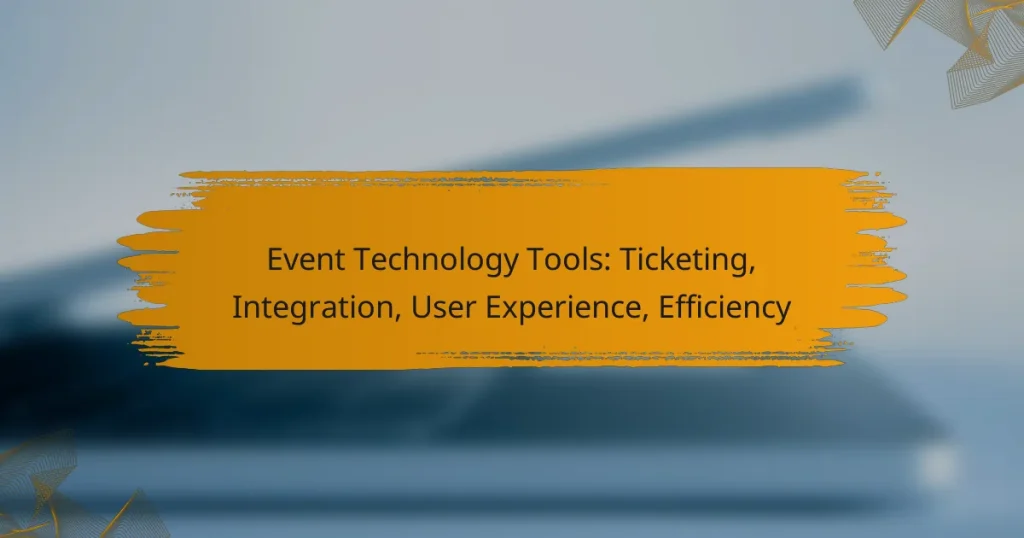Event technology tools play a crucial role in optimizing ticketing processes and enhancing user experiences for attendees. By integrating with various platforms, these tools not only streamline operations but also provide personalized and engaging interactions, ensuring a seamless event journey. With a focus on efficiency and real-time communication, they cater to diverse event types and sizes, making them indispensable in today’s event management landscape.
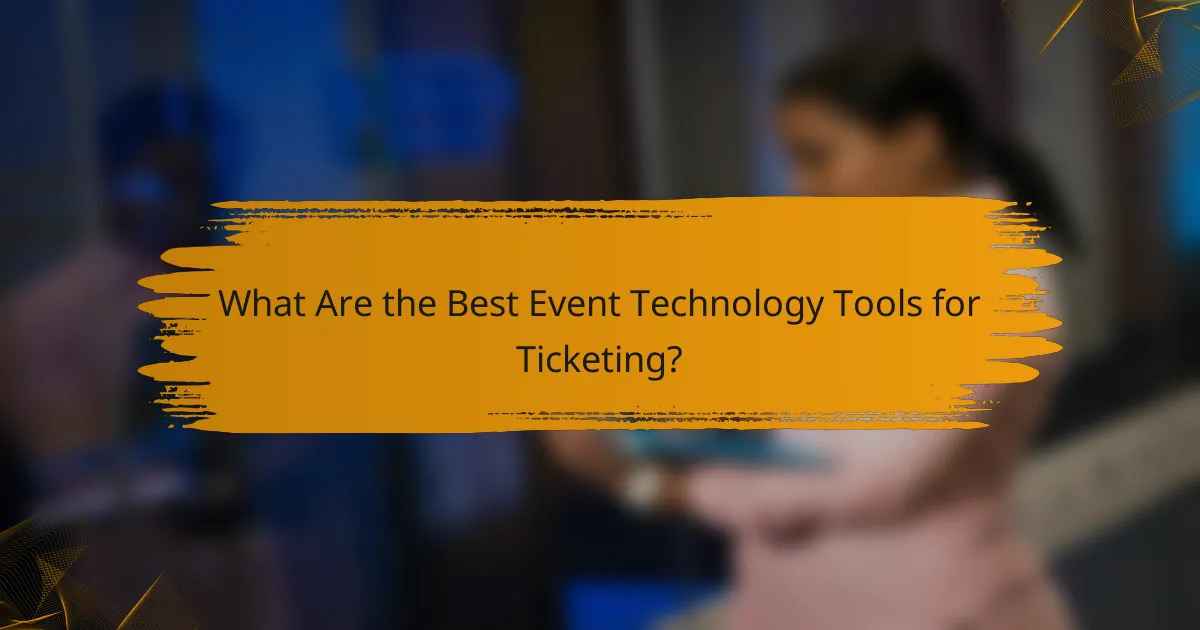
What Are the Best Event Technology Tools for Ticketing?
The best event technology tools for ticketing streamline the ticket purchasing process, enhance user experience, and integrate with various platforms. These tools vary in features, pricing, and usability, catering to different event types and sizes.
Eventbrite
Eventbrite is a popular platform known for its user-friendly interface and extensive features. It allows event organizers to create, promote, and sell tickets for events ranging from small gatherings to large festivals.
Consider its pricing structure, which includes a free option for free events and a fee for paid events, typically around 2% plus a fixed fee per ticket. Eventbrite also offers promotional tools and analytics to track sales performance.
Ticketmaster
Ticketmaster is a leading ticketing service, especially for large-scale events like concerts and sports. It provides a robust platform for ticket sales, with features like dynamic pricing and resale options.
While it offers extensive reach and brand recognition, Ticketmaster’s fees can be higher, often ranging from 10% to 15% of the ticket price. This makes it essential for organizers to weigh the benefits of exposure against the cost.
Universe
Universe is a flexible ticketing solution that caters to various event types, including festivals, workshops, and virtual events. It emphasizes customization, allowing organizers to tailor the ticketing experience to their brand.
Its pricing is competitive, with options for free events and a service fee for paid tickets. Universe also integrates well with social media platforms, making it easier to promote events directly to potential attendees.
Brown Paper Tickets
Brown Paper Tickets is known for its commitment to low fees and excellent customer service. It offers a straightforward ticketing process, making it suitable for community events and smaller gatherings.
The platform charges a flat fee per ticket sold, typically around $1 plus a percentage, which can be more affordable for organizers. Additionally, it provides tools for event promotion and management.
Eventzilla
Eventzilla is an all-in-one event management platform that simplifies ticketing, registration, and attendee management. It is particularly useful for webinars and online events, offering features like custom registration forms.
Pricing is flexible, with options for free events and a tiered pricing model for paid events based on features used. Eventzilla’s user-friendly interface and integration capabilities make it a strong choice for various event organizers.
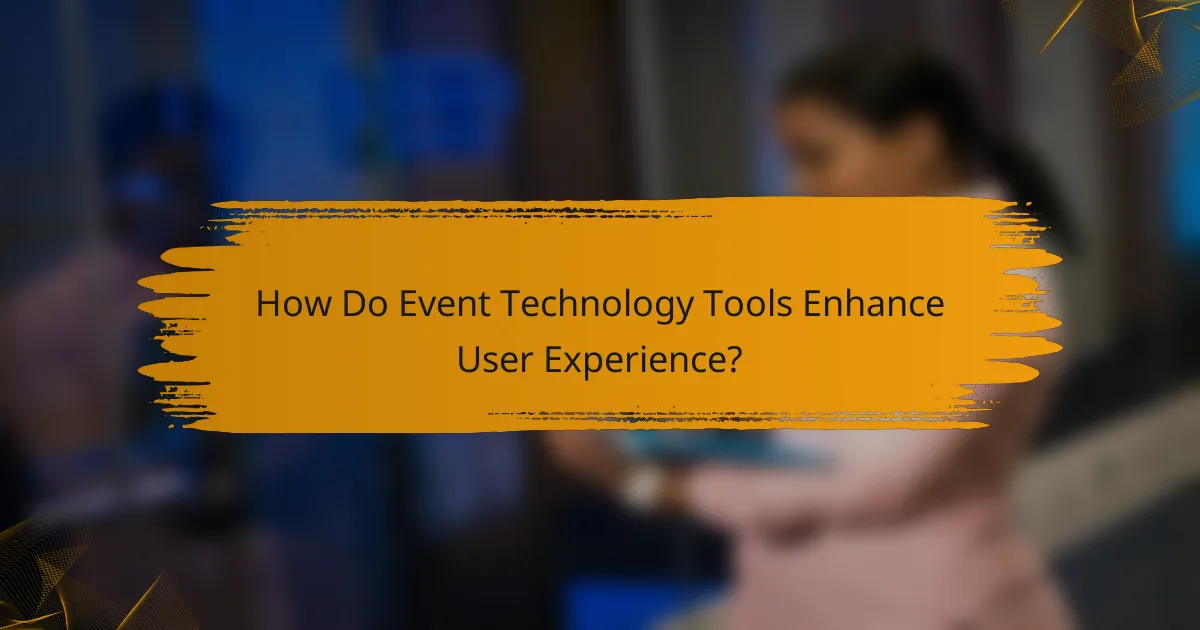
How Do Event Technology Tools Enhance User Experience?
Event technology tools significantly enhance user experience by streamlining interactions and providing tailored solutions for attendees. These tools focus on personalization, engagement, and real-time communication, ensuring that participants have a seamless and enjoyable experience throughout the event.
Personalized Event Apps
Personalized event apps allow attendees to customize their experience by selecting sessions, networking opportunities, and content that align with their interests. These apps often include features like personalized agendas, speaker bios, and venue maps, making navigation and participation easier.
To maximize the effectiveness of personalized apps, event organizers should gather attendee preferences during registration. This data can help in tailoring content and notifications, enhancing engagement and satisfaction.
Interactive Features
Interactive features such as live polls, Q&A sessions, and gamification elements foster engagement and participation among attendees. These tools encourage real-time interaction, allowing participants to share their thoughts and feedback instantly.
Incorporating interactive elements can significantly boost attendee involvement. For example, using live polls during presentations can provide immediate insights into audience opinions, making sessions more dynamic and relevant.
Real-Time Feedback
Real-time feedback mechanisms enable event organizers to gauge attendee satisfaction and address issues promptly. Tools like instant surveys or feedback forms can be integrated into event apps, allowing participants to share their thoughts immediately after sessions.
To effectively utilize real-time feedback, organizers should ensure that the process is simple and quick. Aim for short surveys that take just a minute to complete, which can lead to higher response rates and more actionable insights.
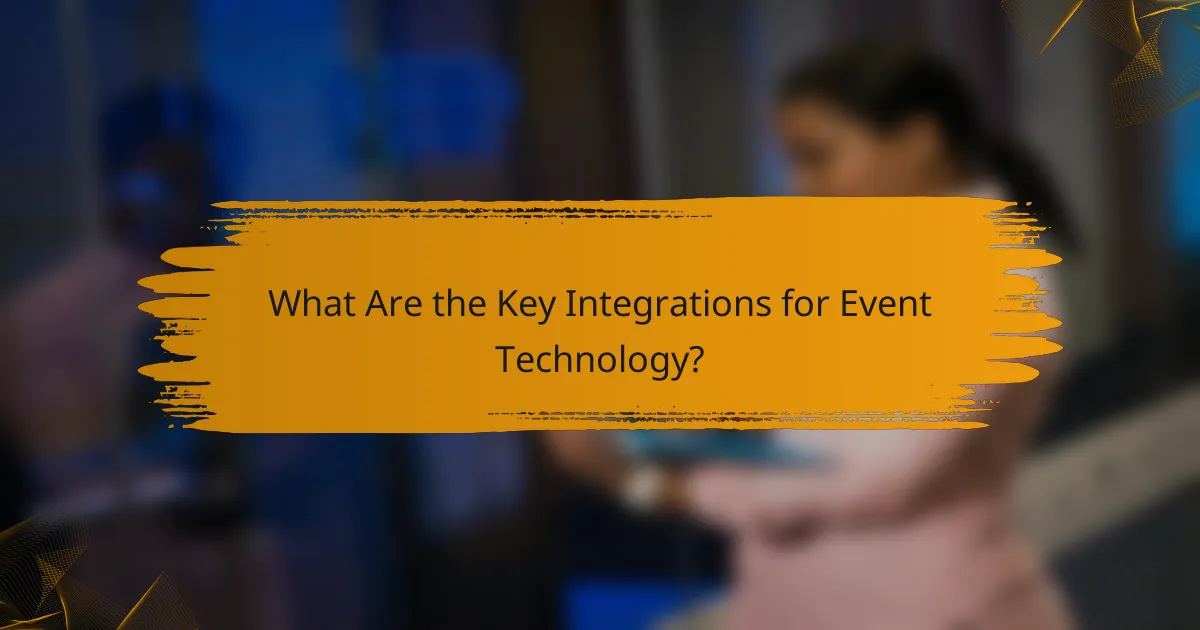
What Are the Key Integrations for Event Technology?
Key integrations for event technology encompass systems that streamline operations, enhance user experience, and improve data management. Essential integrations include Customer Relationship Management (CRM) systems, payment gateways, and email marketing platforms, each playing a critical role in the event lifecycle.
CRM Systems
CRM systems help manage attendee relationships and track interactions throughout the event process. By integrating a CRM with your event technology, you can centralize data, allowing for better segmentation and targeted communications.
When selecting a CRM, consider compatibility with your ticketing platform and the ability to automate workflows. Popular options include Salesforce, HubSpot, and Zoho, each offering unique features that can enhance your event management.
Payment Gateways
Payment gateways facilitate secure transactions for ticket sales and merchandise. Integrating a reliable payment gateway ensures that attendees can complete purchases smoothly, which is crucial for maximizing sales and providing a positive user experience.
Look for payment gateways that support multiple currencies and payment methods, such as credit cards, PayPal, or mobile wallets. Common choices include Stripe, PayPal, and Square, which are known for their ease of use and security features.
Email Marketing Platforms
Email marketing platforms are essential for promoting events and engaging attendees before, during, and after the event. Integrating these platforms allows for automated email campaigns, targeted messaging, and performance tracking.
Choose an email marketing tool that integrates easily with your CRM and ticketing systems. Popular platforms like Mailchimp, Constant Contact, and Sendinblue offer features such as customizable templates and analytics to optimize your outreach efforts.
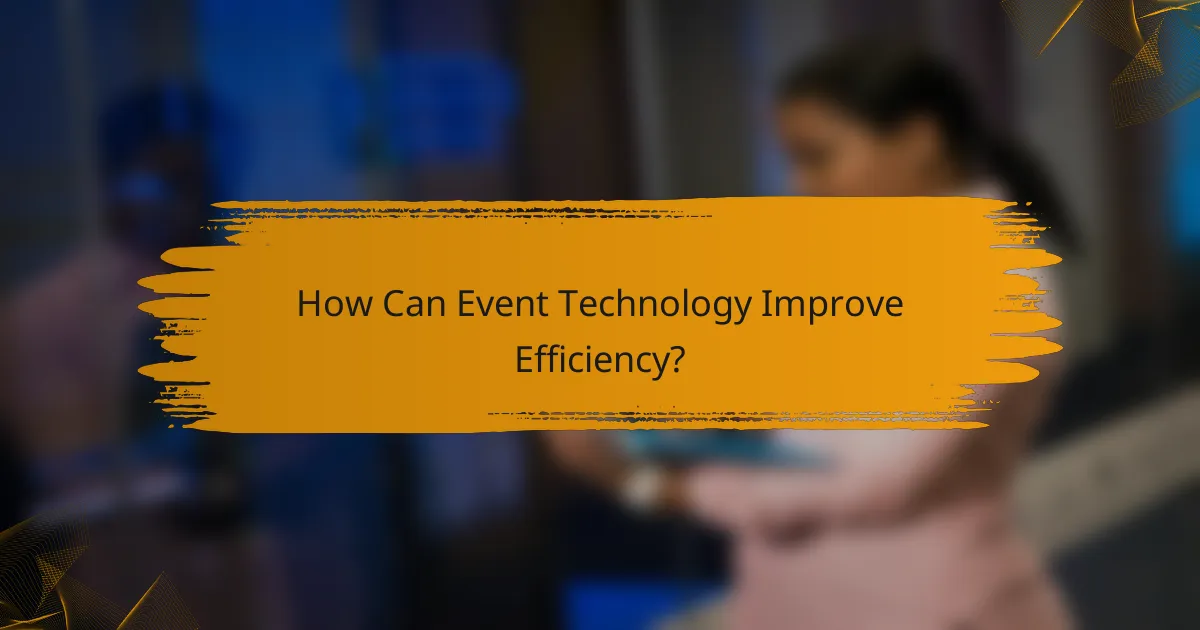
How Can Event Technology Improve Efficiency?
Event technology enhances efficiency by streamlining processes, reducing manual tasks, and improving communication among stakeholders. By leveraging tools for ticketing, integration, and user experience, event organizers can save time and resources while delivering a better experience for attendees.
Automated Check-In Processes
Automated check-in processes significantly reduce wait times and improve the attendee experience. Using mobile apps or QR codes, guests can check in quickly without needing to stand in long lines, allowing for a smoother entry into the event.
Consider implementing systems that integrate with ticketing platforms to ensure real-time updates on attendance and capacity. This integration can help manage crowd flow and provide insights into peak times for check-in, allowing for better staffing decisions.
Data Analytics for Decision Making
Data analytics tools provide valuable insights that can enhance decision-making for future events. By analyzing attendee behavior, ticket sales patterns, and feedback, organizers can identify trends and make informed adjustments to improve future events.
Utilize analytics to track key performance indicators (KPIs) such as ticket sales conversion rates and attendee engagement levels. This data can help optimize marketing strategies and enhance the overall event experience, ultimately leading to increased satisfaction and repeat attendance.
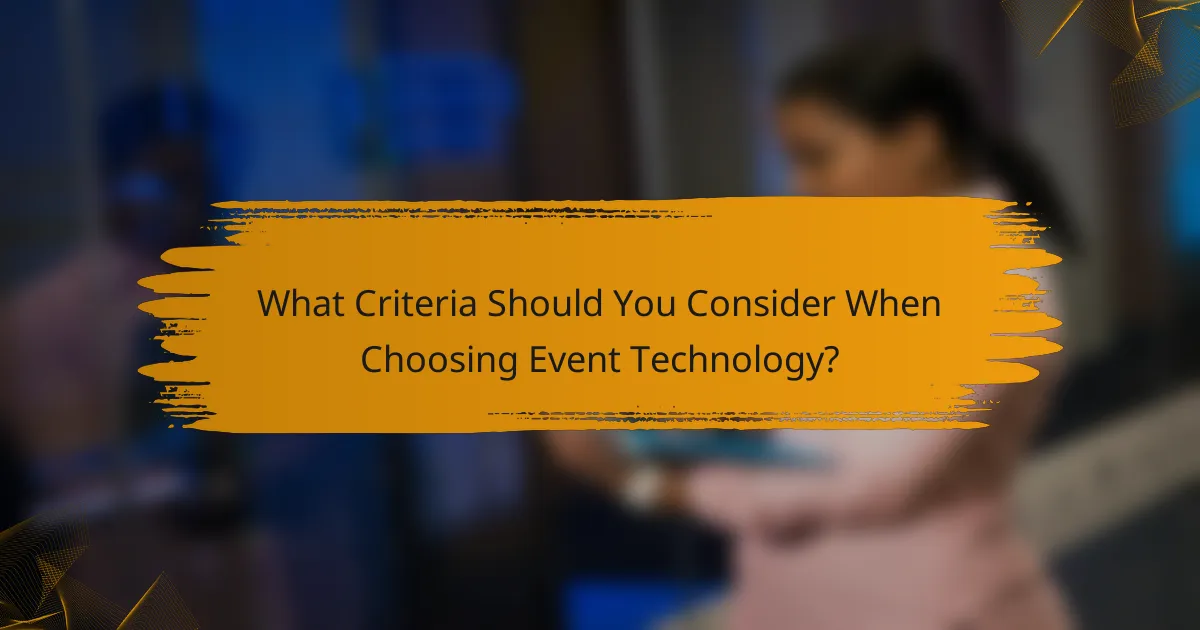
What Criteria Should You Consider When Choosing Event Technology?
When selecting event technology, prioritize factors such as scalability, user-friendliness, integration capabilities, and overall efficiency. These criteria ensure that the tools you choose can adapt to your event’s needs while providing a seamless experience for both organizers and attendees.
Scalability
Scalability refers to the ability of event technology to handle varying sizes and complexities of events without compromising performance. Choose tools that can easily accommodate small gatherings as well as large conferences, ensuring that they can grow with your needs.
Look for platforms that offer tiered pricing models or flexible features that can be adjusted based on the number of attendees or sessions. For instance, a ticketing system that allows you to add more tickets or features as your event expands can save you time and money.
User-Friendliness
User-friendliness is crucial for both event organizers and attendees. A straightforward interface can significantly enhance the experience, making it easier for users to navigate and utilize the technology effectively. Opt for tools that provide intuitive dashboards and clear instructions.
Consider conducting a trial or demo to assess the usability of the platform. Look for features like mobile compatibility and easy access to support resources. Avoid overly complex systems that may require extensive training, as these can lead to frustration and inefficiency during the event.
